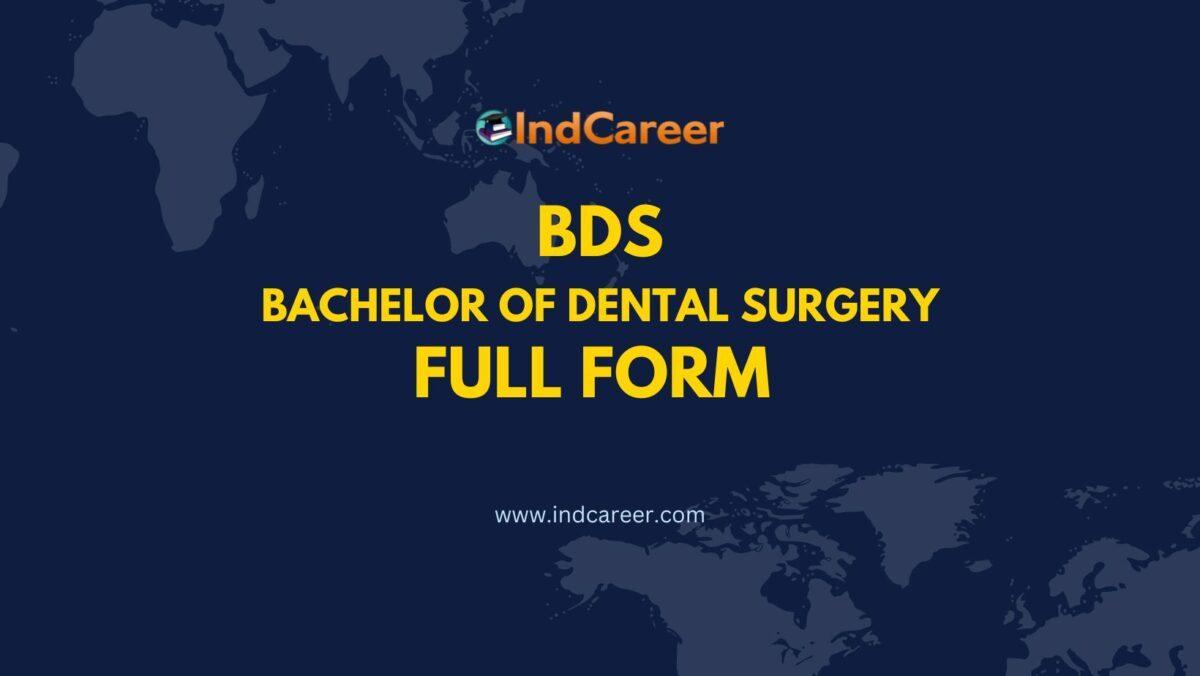Contents
Dentistry is a crucial aspect of healthcare, and dentists play a significant role in maintaining oral health and hygiene. One of the most sought-after courses for aspiring dental professionals is BDS. In this article, we will explore the full form of BDS and delve into its various aspects, including its scope, career opportunities, and importance in the medical field.
What is the full form of BDS?
BDS stands for “Bachelor of Dental Surgery.” It is an undergraduate course pursued by students aspiring to become dentists. BDS is designed to impart comprehensive knowledge and practical training to students, equipping them with the necessary skills to diagnose, treat, and prevent oral diseases and disorders.
Understanding BDS
Definition of BDS
BDS is an essential course that focuses on dental health and surgery. Dental surgeons are trained in various dental procedures, including root canal treatments, tooth extractions, dental implants, and oral surgeries. They also learn to diagnose oral conditions and provide appropriate treatment plans.
BDS in the Medical Field
Dentistry holds a crucial place in the medical field, as oral health is interconnected with overall well-being. Dental issues can lead to systemic diseases and vice versa. BDS graduates contribute significantly to promoting oral hygiene and providing dental care to people of all ages.
BDS Course and Duration
Eligibility Criteria
To pursue BDS, candidates must have completed their 10+2 education with science subjects, including Physics, Chemistry, and Biology. Different universities may have specific requirements, so aspiring students should check the eligibility criteria of the respective institutions.
BDS Syllabus
The BDS curriculum is well-structured, covering various aspects of dentistry. It includes theoretical subjects like Dental Anatomy, Oral Pathology, and Dental Materials, along with practical training in dental clinics and hospitals.
BDS Admission Process
Entrance Examinations
Admission to BDS programs is usually based on entrance examinations conducted at the national or state level. Some well-known entrance exams for BDS in India include NEET (National Eligibility cum Entrance Test) and AIIMS (All India Institute of Medical Sciences) entrance exam.
Counseling and Selection
After clearing the entrance exams, candidates undergo counseling sessions where they can select the dental colleges or universities based on their ranks. The selection process is merit-based, and students are allotted seats according to their preferences and availability.
Career Opportunities after BDS
Private Practice
Many BDS graduates choose to establish their private dental clinics, where they can offer dental services to patients. Private practice allows dentists to have more autonomy and financial independence.
Government Jobs
BDS graduates can also pursue various job opportunities in the government sector. They can work in government hospitals, dental clinics, and public health departments, contributing to community dental care.
Higher Studies
After completing BDS, some students opt for higher studies in specialized fields of dentistry. They can pursue Master’s degrees (MDS) in areas like Oral Surgery, Orthodontics, Periodontics, and more.
Research Opportunities
BDS graduates can explore research opportunities in dental institutes and research centers. They can contribute to advancing dental technology, materials, and treatment procedures.
Challenges Faced in BDS
Academic Challenges
BDS is a rigorous course that demands dedication and hard work. Students often face challenges in coping with the vast syllabus and the integration of theoretical knowledge with practical skills.
Practical Difficulties
Performing dental procedures requires precision and skill. BDS students may initially find it challenging to handle dental instruments and gain the necessary expertise.
BDS vs. MBBS
Differences in Curriculum
BDS and MBBS (Bachelor of Medicine and Bachelor of Surgery) differ in their curriculum focus. While BDS concentrates on dental health and surgery, MBBS is centered around general medicine and surgery.
Scope and Specializations
Both BDS and MBBS offer diverse career opportunities, but they have distinct specializations. BDS graduates focus on oral health, while MBBS graduates become medical doctors.
Importance of BDS in Healthcare
BDS plays a crucial role in maintaining oral health, preventing dental diseases, and treating various dental conditions. Good oral health is vital for overall well-being, making dental care an integral part of healthcare services.
BDS and Dental Research
Dental research is an essential aspect of advancing dental care. BDS graduates can actively participate in research studies to improve dental treatments, technologies, and materials.
Recent Advancements in BDS
With technological advancements, dentistry has witnessed significant progress. Innovations in dental implants, cosmetic dentistry, and digital dentistry have transformed the way dental procedures are performed.
The Future of BDS
The future of BDS looks promising, with a growing demand for dental professionals worldwide. Advancements in dental technology and an increasing focus on oral health will create more opportunities for BDS graduates.
Conclusion
In conclusion, BDS, which stands for “Bachelor of Dental Surgery,” is a vital course that prepares students to become proficient dental professionals. With a well-structured curriculum, practical training, and diverse career opportunities, BDS offers a fulfilling career path for those passionate about oral health care. As dentistry continues to evolve, BDS graduates will play a significant role in promoting oral hygiene and providing quality dental services.
FAQs
BDS stands for Bachelor of Dental Surgery.
The BDS course usually takes five years to complete, including one year of mandatory internship.
Yes, after BDS, you can opt for Master’s degrees (MDS) in various specialized fields of dentistry.
Some common entrance exams for BDS in India are NEET and AIIMS entrance exam.
BDS focuses on dental health and surgery, while MBBS is centered around general medicine and surgery.
Dentistry plays a crucial role in maintaining oral health, which is essential for overall well-being.
